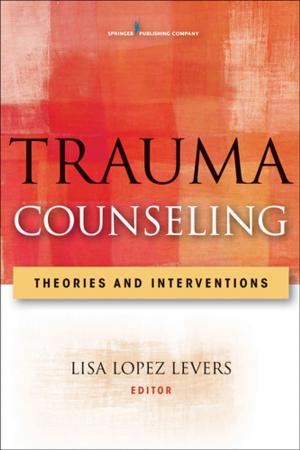Healing From Violence
Latino Men's Journey to a New Masculinity
Nonfiction, Social & Cultural Studies, Social Science| Author: | Christauria Welland, PsyD, Neil Ribner, PhD | ISBN: | 9780826124784 |
| Publisher: | Springer Publishing Company | Publication: | November 26, 2007 |
| Imprint: | Springer Publishing Company | Language: | English |
| Author: | Christauria Welland, PsyD, Neil Ribner, PhD |
| ISBN: | 9780826124784 |
| Publisher: | Springer Publishing Company |
| Publication: | November 26, 2007 |
| Imprint: | Springer Publishing Company |
| Language: | English |
According to the 2000 Census, Latinos accounted for 12.5% of the US population, or 35.3 million residents-the fastest growing population in the United States. The influence of this large and growing demographic can be seen throughout every academic discipline in the numerous books, journals, and societies on multicultural assessment, counseling, and research that have begun to appear. However, one area of inquiry remains largely unexplored; domestic violence within Latino families. Although it appears that such violence occurs as frequently in Latino families as in Caucasian families, little research has been done on this topic and very few counseling programs explicitly developed for Latino families currently exist.
Healing from Violence fills this void. Drawing on a research study of 150 Latino men who completed a year of court-ordered treatment in Southern California, and a four-year pilot study, the authors mix quantitative and qualitative methodology in order to provide counselors with an opportunity to hear first-hand how Latino partner abusive men think about manhood (machismo), interpersonal relationships, (respeto, personalismo, and simpatÌa), and family life (familismo). The authors then use these in-depth portraits to guide counselors in tailoring treatment plans to the specific needs of Latino men.
Voices from Healing From Violence:
"How should a Mexican man be? Respectful, understanding, loving, responsible. A good communicator. If a man had all that, and his partner too, wow! It would be great. I'd like to be like the man I just described - the ideal man, loving, respectful, all that." - Ramon
"The whole time I've been in the program I've been doing something I had never done in my life - reflecting and taking stock of my own life. Putting the good and the bad in the balance." - Raul
"One of the goals of group therapy, of any therapy, is to give hope. Even the man with the worst possible case, where he has lost his marriage and custody of his children, can learn to use respectful relationship skills at work and in a potential new relationship. He may have brought great losses upon himself, but his future is not necessarily bleak." - the Authors
According to the 2000 Census, Latinos accounted for 12.5% of the US population, or 35.3 million residents-the fastest growing population in the United States. The influence of this large and growing demographic can be seen throughout every academic discipline in the numerous books, journals, and societies on multicultural assessment, counseling, and research that have begun to appear. However, one area of inquiry remains largely unexplored; domestic violence within Latino families. Although it appears that such violence occurs as frequently in Latino families as in Caucasian families, little research has been done on this topic and very few counseling programs explicitly developed for Latino families currently exist.
Healing from Violence fills this void. Drawing on a research study of 150 Latino men who completed a year of court-ordered treatment in Southern California, and a four-year pilot study, the authors mix quantitative and qualitative methodology in order to provide counselors with an opportunity to hear first-hand how Latino partner abusive men think about manhood (machismo), interpersonal relationships, (respeto, personalismo, and simpatÌa), and family life (familismo). The authors then use these in-depth portraits to guide counselors in tailoring treatment plans to the specific needs of Latino men.
Voices from Healing From Violence:
"How should a Mexican man be? Respectful, understanding, loving, responsible. A good communicator. If a man had all that, and his partner too, wow! It would be great. I'd like to be like the man I just described - the ideal man, loving, respectful, all that." - Ramon
"The whole time I've been in the program I've been doing something I had never done in my life - reflecting and taking stock of my own life. Putting the good and the bad in the balance." - Raul
"One of the goals of group therapy, of any therapy, is to give hope. Even the man with the worst possible case, where he has lost his marriage and custody of his children, can learn to use respectful relationship skills at work and in a potential new relationship. He may have brought great losses upon himself, but his future is not necessarily bleak." - the Authors















